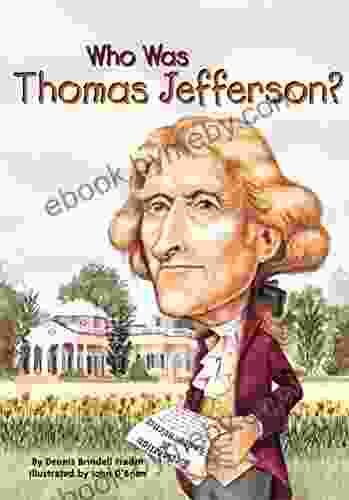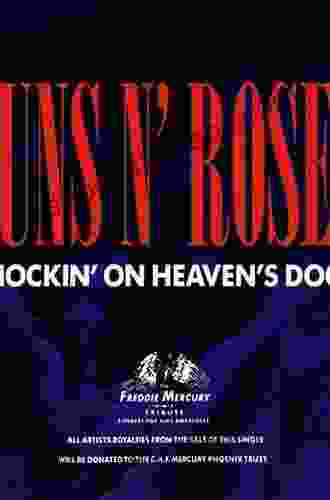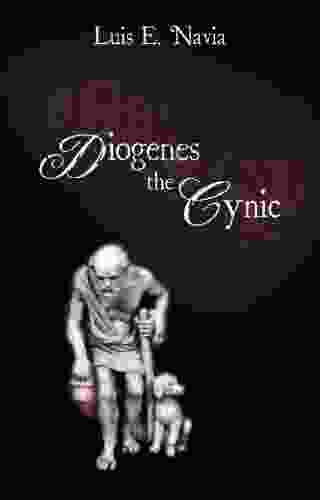Who Was Thomas Jefferson? The Life and Legacy of America's Third President

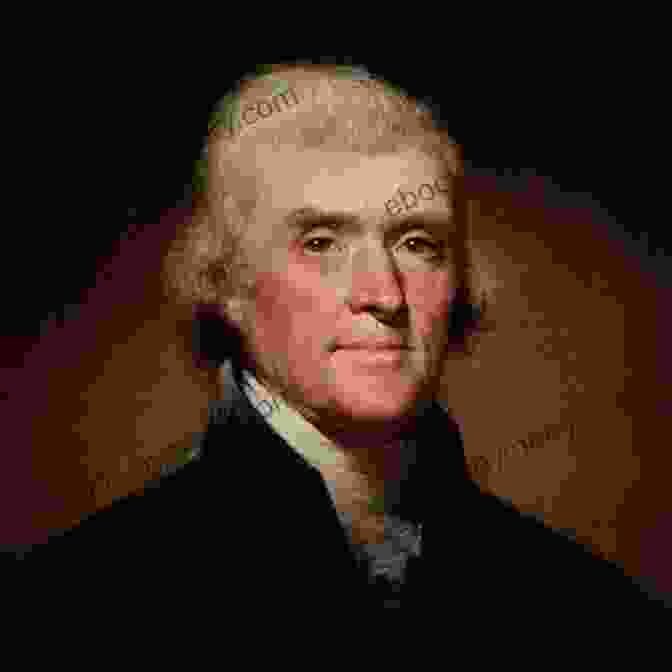
4.8 out of 5
| Language | : | English |
| File size | : | 11897 KB |
| Text-to-Speech | : | Enabled |
| Enhanced typesetting | : | Enabled |
| Word Wise | : | Enabled |
| Print length | : | 108 pages |
| Screen Reader | : | Supported |
Thomas Jefferson was born on April 13, 1743, at Shadwell, his family's plantation in Albemarle County, Virginia. He was the third of ten children born to Peter Jefferson, a successful planter and surveyor, and Jane Randolph Jefferson. Jefferson's father died when he was 14 years old, and he inherited his father's 5,000-acre plantation, which he named Monticello.
Jefferson was a precocious child, and he began his formal education at the age of 5. He attended the College of William and Mary in Williamsburg, Virginia, where he studied law, philosophy, and the classics. After graduating from college, Jefferson returned to Monticello to practice law. He also served in the Virginia House of Burgesses, where he quickly became a leader of the American Revolution.
In 1776, Jefferson was appointed to the Continental Congress, where he helped to draft the Declaration of Independence. The Declaration of Independence was a bold statement of American independence, and it helped to inspire the American colonies to fight for their freedom. Jefferson also served as the governor of Virginia during the American Revolution, and he helped to lead the state to victory.
After the American Revolution, Jefferson returned to Monticello, where he continued to write and farm. He also served as the first Secretary of State under President George Washington. In 1800, Jefferson was elected president of the United States. He served two terms in office, and during that time he oversaw the Louisiana Free Download, which doubled the size of the United States. Jefferson also founded the University of Virginia, which is one of the most prestigious universities in the United States today.
Jefferson retired to Monticello in 1809, where he continued to write and farm until his death on July 4, 1826. Jefferson is considered to be one of the most important figures in American history, and his legacy continues to inspire Americans today.
Jefferson's Beliefs
Jefferson was a man of many beliefs, but some of his most important beliefs included:
- The belief in democracy. Jefferson believed that all people are created equal, and that they should have the right to participate in government.
- The belief in individual liberty. Jefferson believed that individuals should be free to make their own choices, and that government should not interfere with their lives.
- The belief in the separation of church and state. Jefferson believed that religion should be a private matter, and that it should not be used to justify government actions.
- The belief in education. Jefferson believed that education was essential for a free and democratic society.
Jefferson's Accomplishments
Jefferson was a man of many accomplishments, but some of his most important accomplishments include:
- The drafting of the Declaration of Independence. Jefferson's Declaration of Independence was a bold statement of American independence, and it helped to inspire the American colonies to fight for their freedom.
- The founding of the University of Virginia. Jefferson founded the University of Virginia in 1819, and it is one of the most prestigious universities in the United States today.
- The Louisiana Free Download. Jefferson oversaw the Louisiana Free Download in 1803, which doubled the size of the United States.
Jefferson's Legacy
Jefferson's legacy is still felt today. He is considered to be one of the most important figures in American history, and his beliefs and accomplishments have helped to shape the United States into the nation it is today. Jefferson's legacy is one of democracy, individual liberty, and education. He is a reminder that one person can make a difference in the world.
4.8 out of 5
| Language | : | English |
| File size | : | 11897 KB |
| Text-to-Speech | : | Enabled |
| Enhanced typesetting | : | Enabled |
| Word Wise | : | Enabled |
| Print length | : | 108 pages |
| Screen Reader | : | Supported |
Do you want to contribute by writing guest posts on this blog?
Please contact us and send us a resume of previous articles that you have written.
 Book
Book Novel
Novel Page
Page Chapter
Chapter Text
Text Story
Story Genre
Genre Reader
Reader Library
Library Paperback
Paperback E-book
E-book Magazine
Magazine Newspaper
Newspaper Paragraph
Paragraph Sentence
Sentence Bookmark
Bookmark Shelf
Shelf Glossary
Glossary Bibliography
Bibliography Foreword
Foreword Preface
Preface Synopsis
Synopsis Annotation
Annotation Footnote
Footnote Manuscript
Manuscript Scroll
Scroll Codex
Codex Tome
Tome Bestseller
Bestseller Classics
Classics Library card
Library card Narrative
Narrative Biography
Biography Autobiography
Autobiography Memoir
Memoir Reference
Reference Encyclopedia
Encyclopedia Rachel Russ
Rachel Russ Samuel T Heart
Samuel T Heart Tim R Swartz
Tim R Swartz Michael R Adamson
Michael R Adamson Julius Caesar
Julius Caesar Tali Carmi
Tali Carmi Will Dunne
Will Dunne Keith Foskett
Keith Foskett Yossi Lapid
Yossi Lapid Kari Kampakis
Kari Kampakis Laura Bogen
Laura Bogen Marcel Liebman
Marcel Liebman Katie Cotugno
Katie Cotugno Keisha Gresham
Keisha Gresham Karyl Rickard
Karyl Rickard Tamar Hermes
Tamar Hermes Robert Draper
Robert Draper Karen Inglis
Karen Inglis Kaylee Hooper
Kaylee Hooper Kazuki Ebine
Kazuki Ebine
Light bulbAdvertise smarter! Our strategic ad space ensures maximum exposure. Reserve your spot today!

 Alfred RossNiall Horan 201 Facts For True Fans: The Ultimate Guide to the One Direction...
Alfred RossNiall Horan 201 Facts For True Fans: The Ultimate Guide to the One Direction...
 Albert ReedThe Amazing Afterlife Of Animals: Embark on a Heartfelt Exploration of Life...
Albert ReedThe Amazing Afterlife Of Animals: Embark on a Heartfelt Exploration of Life... Alexander BlairFollow ·6.2k
Alexander BlairFollow ·6.2k Haruki MurakamiFollow ·11k
Haruki MurakamiFollow ·11k Jim CoxFollow ·11.6k
Jim CoxFollow ·11.6k Terry BellFollow ·14.6k
Terry BellFollow ·14.6k Joseph FosterFollow ·16k
Joseph FosterFollow ·16k Edgar HayesFollow ·18.4k
Edgar HayesFollow ·18.4k Stephen FosterFollow ·3k
Stephen FosterFollow ·3k Howard PowellFollow ·4.2k
Howard PowellFollow ·4.2k
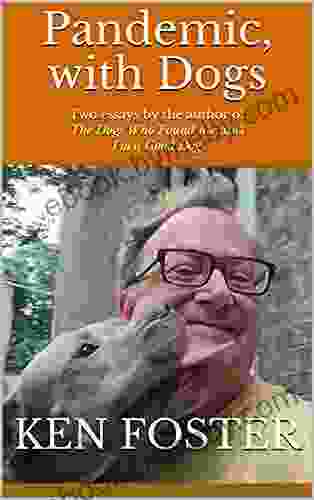
 George Orwell
George OrwellPandemic with Dogs: Two Essays
By Susannah Charleson In the midst of...

 Leo Mitchell
Leo MitchellAdam Smith's The Wealth of Nations: A Classic Treatise on...
Adam Smith's The...

 Cade Simmons
Cade SimmonsUnlock Your Communication Potential: Effective Techniques...
Communication is a fundamental...

 Floyd Richardson
Floyd RichardsonFire and Ashes: Success and Failure in Politics
Fire and Ashes: Success and...
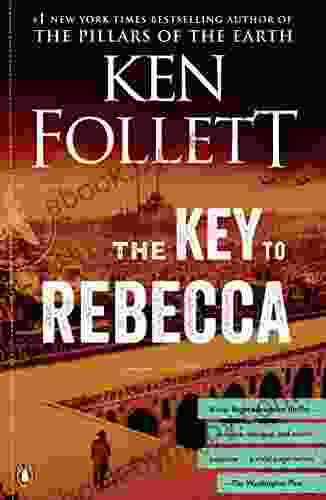
 Oliver Foster
Oliver FosterUnlock the Enchanting Mystery of Ken Follett's "The Key...
Embark on a captivating literary journey into...
4.8 out of 5
| Language | : | English |
| File size | : | 11897 KB |
| Text-to-Speech | : | Enabled |
| Enhanced typesetting | : | Enabled |
| Word Wise | : | Enabled |
| Print length | : | 108 pages |
| Screen Reader | : | Supported |


